TESTIMNONIALS
KA’VON JEMISON
2023 Scholarship Recipient
ROBERT SWAFFORD JR.
2024 Scholarship Recipient
SOFIA GONZALEZ
2021 Scholarship Recipient
BRIANAMARIA TRICE
2016 Scholarship Recipient
EVA FRANTZEN
2019 Scholarship Recipient
School: Marquette University
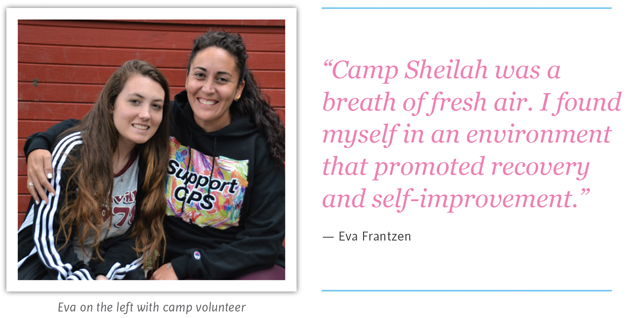
Eva Frantzen was 15 when she was pulled out of her high school class, and nothing could prepare her to find out that not only had her father died, he had been shot and killed some time the night before.
Even harder is not having any answers to the questions of who did that to him, and why?
It’s a time in her life she’ll never forget, and one that can be hard to talk about. Eva recalled, “I lost my dad in 2016. He and my mom were divorced, so they lived in separate houses. We were at a soccer tournament all weekend, me and my mom and my brother. No one had heard from him for a couple of days, which wasn’t unusual. We came back from the tournament, and on Sunday, someone shot and killed him. We found out on Monday morning and don’t know many details about it.”
A freshman at Marquette University, Eva is now 18. Looking back to those high school days, said, “I had friends who had parents who had passed away, but I had never had anyone in my life who had someone in their life or a family member be a victim of homicide. So, I just felt super alone.”
Discovering Others Like Her
When her mom dropped her off at Camp Sheilah the first time, it was a bit bewildering for Eva. Up until then, everything she had done was therapy-based, but this was different, and her mom hadn’t given her much of an explanation.
Instead of any of the things she might have imagined about a camp for kids who had lost a loved one to homicide, Eva said, “Camp Sheilah was a breath of fresh air. I found myself in an environment that promoted recovery and self-improvement. I think the biggest thing was knowing that I wasn’t alone and that there were people everywhere, and people my age, too. It was a community where I felt like I was safe and able to talk about what happened without being seen as like, ‘Oh my God, that’s crazy, I can’t believe that happened’ because it’s something that happened to everybody there.”
It was there that Eva shared her story with others for the first time. She remembered, “I think the overwhelming comfort and openness that I felt really stemmed from the supportive environment that I was provided over those three days. I wasn’t pressured to do or share anything that I didn’t want to, and it was precisely this lack of pressure that motivated me to push myself to be open about my dad’s death for the first time in my life.”
Learning How to Talk About it
Eva also learned that the death of her father didn’t have to weigh her down forever. She could see all those kids around her, who were dealing with the same thing she was, recognized something her other friends didn’t.
“Everyone there knew it was crazy, but they also knew the hard part wasn’t that they were killed in a homicide. It was the fact that they had died,” Eva pointed out, adding that homicide doesn’t maximize or minimize her loss. It’s a circumstance, much as cancer or heart failure is.
“I think the most important thing that I got from camp was I had never really been emotionally available or willing to talk about what happened,” she added. “I’m much more able to talk about it. I feel like it’s not something that has to hold me back.”
Being a part of small groups with others her age, some who looked really tough—as though they’d never had to deal with anything like homicide—didn’t intimidate her. Instead, it was oddly reassuring and showed her she was in a space where she could be sad and not judged for it.
As a result, Eva said, “I’m not ashamed that I do have pain and sadness about it. I know what my dad would want me to do and how he would want me to live. So, instead of just being sad about it all the time, like I was before I went to camp, I’m now enlightened, like I’m able to live a better life.”
Life Has Changed
If the Doyle family and donors were together in a room with her, Eva said, “I would just say thank you. I’m just so grateful for the foundation, for everything that they’ve done for me. I feel like my life is completely different. I can’t even put it into words. They’ve completely changed my life and have personally invested in my future. Helping pay for my college makes me feel so good, and I’m really grateful.”
BRADLEY MOORE
2019 Scholarship Recipient
School: Central State University

Bradley Moore was two when his mother crossed the street and a drunk driver hit and killed her, running from the scene. He went to live with his grandmother and then, when he was in fifth grade, she died from breast cancer.
Today Bradley is 18, attends Central State University, and while he remembers the day when he lost his grandmother clearly, he can’t quite remember his mother’s voice. Losing his grandmother at such a young age piled more on top of the struggles he already had from missing his mother.
Young boys don’t know how to deal with those blows, so he dealt with them the only way he knew, by holding in his feelings and not talking to anyone about what had happened. Not his aunt. Not his brothers. Not his sister.
“I’ve realized that, yeah, it didn’t affect me very well,” he said. “I just had an attitude 24/7. Waking up for school every day, not wanting to look anybody in the eye and say hello, or anything. It was my attitude. I never had positive energy. I was always in the negative. I just never had a smile on my face.”
Life Changing Experience
Bradley says that going to Camp Sheilah and the people he met there, including the Doyle family, changed his life. Saved his life. If he hadn’t gone there, he said, “I probably wouldn’t be here honestly. I don’t think I would have been here because it changed my whole life around…The world just had me in a mindset that I didn’t want to be in. I was depressed for a while and just going to camp helped me. Even at a young age, going through stuff like that, it really helped me look at things completely different. I don’t think I would be here if it weren’t for camp. Probably none of my family would be here if it weren’t for camp.”
Equally important was the difference it made with his family. His siblings also went to camp and when everyone was back home, they found out the healing had begun. Bradley said, “You never know when it could be your last day or your last time talking to somebody. It could happen in the blink of an eye. You could wake up the next day and someone’s gone. That made us come closer together and made us bond even more.”
A Different Person Today
Because of one weekend–one camp for kids—Bradley says he came back a different person in ways no one would have predicted.
When he sees someone who is hurting, Bradley is quick to go to their side and try to figure out what the problem is. He explained, “I help them solve whatever is going on. I’m always in a good mood. You’ll never see a frown on my face unless I lost my wallet or something. I just stay in a good mood. I help everybody around me. I don’t like seeing nobody struggle, I don’t like seeing nobody in a bad mood.”
Gratitude and Looking Ahead
Bradley was just getting out of class when Kelly Paroubek called him. Looking back at that moment, he said, “I cried. I think I cried the whole day. When she told me I won the scholarship, I just kept saying thank you and she kept telling me, ‘You’re welcome.’ That was probably one of the best moments of my life. There’s people out there that care about you, even when you don’t expect it.”
To those who have donated financially to the foundation, Bradley says, “Thank you. You’re making a big change. It’s going to be global; it’s going to go across the whole world. I would tell them to keep doing what they’re doing, ‘cause it is really changing people’s lives.”
As he thinks of the Doyle family and looks to the future, he added, “I have no worries at all. I stay focused, live my life to the fullest…They really did help me and I’m really thankful for them. Every time I speak to them, I tell them I love them. They treated me like I was one of their family members.”
BENJANAE SMITH
2017 Scholarship Recipient
School: Western Michigan University

Tell us about the person you lost to homicide?
I lost my father to homicide when I was about seven years old. I didn’t really get to know who he was or really bond with him. It was tough growing up without a father, but I made it through.
How has the SAD Foundation influenced your life?
The SAD Foundation has influenced me by making me want to always volunteer and help others. The big buddy program (the former name of the foundation’s mentoring program) was a great program. It is what influenced me the most. My big buddy watched me grow and helped me mature into the young lady that I am today. She has watched me grow for about six years and every year she tells me how I have grown. Now I want to share that same influence with younger people.
What is your most memorable experience at Camp Sheilah?
The most memorable experience of camp was always being with my big buddy. I believe the buddy program was very important to the camp’s overall effectiveness. She was like the support system I never really had. She understood me when I needed her to, guided my decisions, and gave advice when needed. Support is very important when grieving. Big bud-dies were always there to make you smile and hug you when you needed. The bond was also something that I could take away from camp.
How did you feel when you found out about the scholarship?
When I found out about the scholarship I was pretty excited. Not only were they offering me an experience but also support for my future. I felt like the camp wanted to help their campers in any way that they could and I think that is very important — which is why I want to come back to give back and volunteer.
Tell us more about coming back as a volunteer.
I want to come back and help others receive the same, if not better, experience I did. I want to see the new way the camp is run and continue to learn new coping skills for myself and sharing them with others. Coming back will also help keep connections with some of the great people that I met through the camp.
What’s next up for you?
I’m not really sure what’s next for me. I am just taking life day by day as it comes. I’m planning on continuing my college journey and earning at least a 3.5 (GPA), getting an internship this summer to get a head start on some things, and helping people to the best of my ability. I want to join a mentoring program because I know how mentors can impact your life, help you grow and direct you to the right path. Hopefully, when I come back as a volunteer, I will be able to be a big buddy in the near future.
What’s your next peak?
I don’t have a peak. I plan on continuing to grow and better myself as life goes on. I don’t want to limit myself because there is always room for improvement.
Final thoughts?
The scholarship makes a huge difference. I wasn’t able to pay room and board first semester so I had to take out a loan. Second semester, I won’t be stressing about it and it will be all paid. Long-term, I won’t have to pay that $5,000 back. It is a feeling of accomplishment because it’s something I worked for.
Thank you for the opportunity and experience. The program has helped me meet some of the most warmhearted people. I believe that many more should be able to experience it, and I am looking forward to coming back to volunteer.
BRELYN MOORE
2017 Scholarship Recipient
School: Central State University
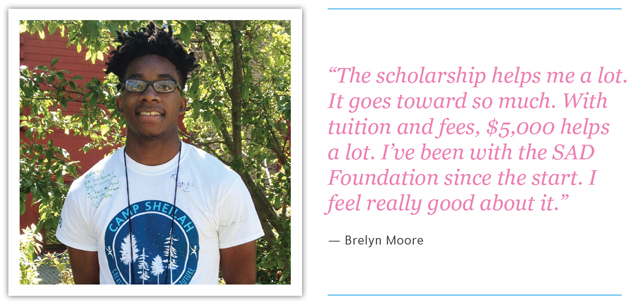
Tell us about the person you lost to homicide?
I lost my mom, Wanda Price, in 2005. I was five years old when this happened; she got hit by a car from a drunk driver. My mom was great. I loved her to death, and it hurt me a lot to lose her at such a young age.
How has the SAD Foundation influenced your life?
The SAD Foundation has had a big influence on my life because of everyone just being there for me. I never knew there were people and support systems out in the world like the Doyle’s and their foundation. They helped so much in my life to the point where now I’m able to open up about the tragedy in my life to people and tell them my story. They have helped so much, and I love them so much.
What is your most memorable experience at Camp Sheilah?
My most memorable experience at the camp was my first year when we had our first healing circle and, when I went to tell my story, I broke out crying and it was really hard because that was my first time ever telling my story. I knew that I had the love and support from everyone at that camp and that it was their listening to my story that caused me to end up getting it all out and telling my story.
How did you feel when you found out about the scholarship?
I felt great when I found out about the scholarship. I’m really glad that I got it. I appreciate the Doyle’s for choosing me for it.
Any plans to come back as a volunteer?
Yes, I will come back every year for the camp. I love it.
What’s next up for you?
What’s next for me is to get through this year of school and stay on top of everything and keep pushing every day, praying, and continuing to keep working hard.
Final thoughts?
The message and the reason why SAD Foundation started is great. When I first heard about the foundation I would never have thought there could be any camp for something so bad and yet where you have such a good time and share with a lot of people what happened in your life. I will support it forever. It’s a great thing.”
I never told my story until I came to the camp. With the support system from everyone around me and the Doyle family, I was open enough to share my story with people I never knew. I was comfortable because I felt loved and supported by everyone.
INFINITY RAMEY
2016 Scholarship Recipient
School: Western Michigan University
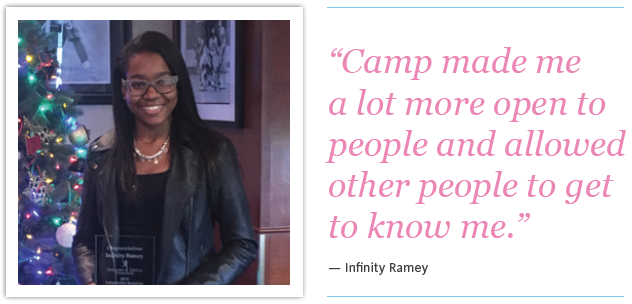
Infinity Ramey was 14 when she first came to camp five years ago. Today, she is a 2016 SAD Foundation scholarship recipient and a first-year psychology major at Western Michigan University. Thoughtful, composed, quietly confident, she aims to be a forensics psychologist. Her siblings – Benjanae, Ralph and Chance as well as her cousin DeCari – have all attended Camp Sheilah.
CHANGES OVER TIME
When she first came to camp, it was with folded arms and a moody teenager’s stoic air. Nobody at home talked about the loss Infinity experienced when she was six years old. Before coming to camp, Infinity says, “I never gave people a chance to know me. I brushed it off. I didn’t need more friends. Camp made me a lot more open to people and allowed other people to get to know me.”
Prodded by her aunt and grandmother, she unpacked her bags in the woodsy cabin that first day with the notion that if she had to be there she might as well take something from it.
She was surprised by what followed. During the first camp, she actually had fun. The second camp the following year, however, was a tipping point. “I started learning after the second one that I was connected with other people,” she said. “After five years . . . I talked to everybody I went to camp with. I just know that I have someone there for me, not just family. It can be a friend, my big buddy. Someone is always there for me.”
Finding people outside her family who cared proved to be critical in Infinity’s grief journey. Like many children, she worried about her family’s feelings. Being sensitive to them made talking about her loss difficult. What if they were depressed? What if it hurts them to talk about their loss or bring up sad memories? She says people outside the family are different. “I just always had somebody who went through what I went through,” Infinity points out. “I’m not the only one who went through something like that.”
SCHOLARSHIP EASES COLLEGE BURDEN IN MORE WAYS THAN ONE
Infinity was very grateful for the scholarship. It will help pay off her balance next semester on the heels of other scholarships. It also gave her confidence. Going off to college is a scary step for young people – you replace the comfort and security of home with navigating solo – but leaving home with a loss by homicide makes college even more intimidating. Infinity explains, “Everyone else’s parents come down for family weekend and it’s the mother and the father. I didn’t have that coming here. I have my stepfather – but you always want your father.”
She looked for a support group, but there was none. “There’s a lot of support groups for those who lost parents by cancer, for example, but they don’t have one for people who have lost someone to homicide,” she said. “I feel like they should have more support groups for people like me and my siblings. They should look at all the reasons why people don’t have a family member in their life. It’s a different type of trauma.”
In fact, she says there aren’t a lot of things out there in general. “A lot of people don’t get what we go through on a daily basis. Hopefully, more people will support this (the SAD Foundation) so it can help more people.”
CONNECTING MAKES A DIFFERENCE
Experiencing a death in her family by homicide definitely influenced Infinity’s career goals. Like many scholarship recipients, she has taken her tragedy and used it for something good – to help her community. She likes talking to people and figuring out why they do the things they do. She is intrigued by crime scenes and about finding the truth behind people’s actions; these are qualities important for a forensics psychologist.
As for her loss, she has learned to live with it as an “everyday” thing. “A lot of people who were there (at camp) – you never thought they would go through what they did,” said Infinity. Camp helped her deepen connections with people. One of those people includes the mentor and friend she was paired up with at camp, Kristie.
Do they still talk? Do they ever! “We talk all the time,” said Infinity with a big smile. “She came to my graduation. She lives in Illinois. She was talking about coming to the luncheon for the scholarship. She’s like a mom. She tried to make my bed at camp.” Infinity describes Kristie as nurturing, always there “whenever I need her,” a big support system. In addition to Kristie, Infinity also made a deep and lasting friendship with Brianamarie Trice, a college freshman who also earned a SAD Foundation scholarship in 2016. In talking about the luncheon, Infinity adds wistfully, “Hopefully, Bri can come.”
A FOOTPRINT OF KINDNESS
“The mark I want to leave on this world is that I want people to know that I love to help people,” she says. She credits Camp Sheilah for bringing out this quality. By hearing other people’s stories – especially those from peers – she realized she was not the only one who grieved loss by homicide. She adds that after camp, she “wanted to help anyone I could who was going through what I went through.”
BRIANAMARIE TRICE
2016 Scholarship Recipient
School: Clark Atlanta University
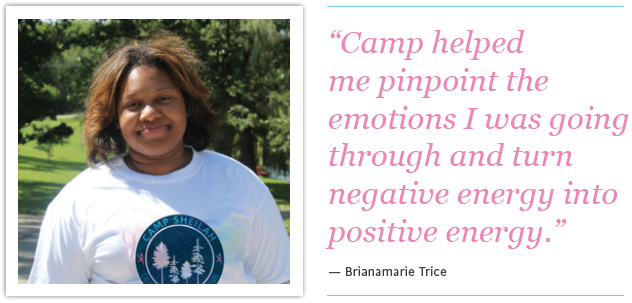
A winter coat left behind at a party in the Englewood neighborhood. A husband and father turns around to go back in. Wrong time, there’s a fight. Words are exchanged. Tensions rise. Shots are fired. A future is gone in an instant.
It’s hard to believe that Brianamarie Trice, a 2016 SAD Foundation scholarship recipient, lived through such struggles. A political science major at Clark Atlanta University, she is confident, poised in her speech and hopes to someday put those skills to work in the courtroom as an attorney. She could be any college freshman searching at the bottom of a backpack for laundry quarters and cramming for final exams. What led her to cross paths with the SAD Foundation, however, does make her story unique. She was four years old when she lost her father violently, suddenly and, worst of all, without reason. For the next decade, she would search for understanding. Why had her father been taken this way? What could she have done to prevent it? Was she not worthy of even having a father?
A DIFFICULT ROAD
One by one, these thoughts laid a path to a suicide attempt before the end of her eighth grade year. Briana – as friends she has met through camp call her – wanted answers. Instead, she found hopelessness, loneliness, anger. “My first year going into camp, I was a freshman. The year before I had gone through a dark period,” she said. “I felt like I was unworthy for anything. Nobody understood what it was like having a family member killed for no reason at all.” Anger’s constant hum resonated above everyday life. Briana talks about disrespectingteachers and always pushing against life’s currents. Nobody understood where her emotions were coming from. She was frustrated she had no one to talk with.
FINDING HOPE
There’s a quote: “Without the dark, we’d never see the stars.” Briana’s darkest days began to clear after attending the SAD Foundation camp. “Camp helped me pinpoint the emotions I was going through and turn negative energy into positive energy,” said Briana. “I learned valuable coping skills. I love to write poetry. Going to camp helped me develop that more. At Sunday service, they asked me to write the poem for the group at camp.”
The SAD Foundation helped Briana along her grief journey. “I look for the good in everybody. I don’t ponder on negative events. Now, I recognize those negative behaviors. I will not let anyone take me to the point where I am negative. I want to be true to myself when I go to sleep at night. I have to be optimistic and I have to always see the good.”
THE SCHOLARSHIP: WHAT IT REALLY MEANS
Briana describes learning about the scholarship as a “graduation” all on its own after four straight years of attending the SAD camp.
“I felt honored. They recognized my growth and what it means to me to be part of their program. A surreal experience. I felt very grateful. The scholarship itself, the tangible monetary part will make a difference in my life because college is expensive. The significance of it . . . “ she hesitates, searching for the right words.
Then she finds them in a rush, bringing what she had first searched for at camp, just a handful of years ago, full-circle. “They felt like I deserved it,” she said with finality.
MAKING A DIFFERENCE
Briana talks about her father in hushed tones. But then the lawyer comes out in her. And she addresses the reality behind the violence. “I was always angry that someone can take a life, not knowing if they are father, a husband, somebody’s daughter, somebody’s son, a pillar in the community. I’ve been angry that someone can judge that this person no longer has to live. That is what has affected me all my life. People don’t think about that. They don’t know the impact they are making. Throughout my childhood and my teen years and my adult life, I will never see my father again, he will not walk me down the aisle, he will not see me graduate.”
Briana ties together all her experiences at camp, her grief and her vision for her own life by saying, “I’m going into law because I want to change that position. There are children all over America and all over this world growing up without their parents and no one cares.”
The SAD Foundation stood for something different. “The Doyles showed me that someone cares,” she says. “That affected me because all my life I was looking for someone who cared. The Doyles really understood the notion of violence that can tear your world apart. I found a family and organization that cared. For me, my family told me I was loved and told me that I was wonderful. But even though that is extraordinary, it’s not enough and doesn’t replace my father. Having people outside my family who cared enough to help and had that drive . . . I think that is the most beautiful thing I have ever encountered in my life.”
DANIELLE COOPER
2015 Scholarship Recipient
School: Southern Illinois University
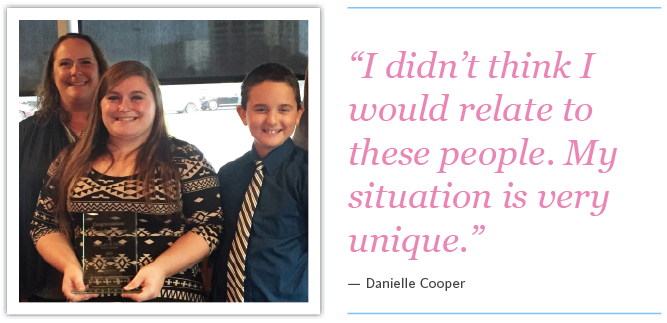
Digging in dirt. Mulling over weather. Enriching soil for tiny seeds to take root and thrive. These are things Danielle Cooper, 18, enjoys. Her major at Southern Illinois University is crop soil and environmental management with a specialization in science and a minor in plant biology.
Growth proved a major theme for Danielle this past year. On the heels of attending her first SAD camp, she received the 2015 Sheilah A. Doyle Foundation Scholarship during a luncheon at Ditka’s restaurant in Oak Brook, Ill. Her older half brother, Josh Cooper, received the same scholarship in 2011, the inaugural year for SAD’s scholarship program.
Throughout high school and now college, the bubbly, pretty and well-spoken college sophomore (she earned 15 college credits in high school, completing her freshman year by January 2016) gushes about lessons learned from the Future Farmers of America and how it parallels SAD. “In collegiate FFA,” she explains, “you get to shape high schoolers and run their leadership conferences. Now I get to share what I’ve learned with other people. That’s why I joined collegiate – to give younger students an opportunity that I had.” Like FFA, SAD teaches the value of leadership. In both cases, Danielle says she’s learned a lot about herself and is considering returning to SAD as a volunteer.
One of Danielle’s favorite things about camp was mentor Katy League. At just an inch over five feet, Katy was delighted to be the taller of the pair (Danielle is four feet nine inches). “That doesn’t happen often for her,” joked Danielle who describes her mentor as “not quiet but not loud.” She adds, “She didn’t treat me like a child. She knew I was nervous. I’ve had a job since I was 14 years old. I’m very independent. She didn’t need to be a mother, she needed to be a best friend. I don’t know how I would have enjoyed camp otherwise. I could talk to her about things. She and I could go deeper into conversations in small group.” The two stay in touch via text.
Prior to attending camp, Danielle was skeptical. “My dad died when my mom was pregnant with me,” she said. “I didn’t think I would relate to these people. My situation is very unique.” She also wasn’t sure about being the oldest of all the campers. “I live in a dorm six hours from my parents. Here I am with a mentor. What if they don’t like me or they judge me?” From almost the first moment, though, Danielle was put at ease. “I’m really, really glad because it did help a lot to know that, even though my situation is different, I’m not alone and there are people who understand how I feel.” She added, “I can be myself around these people. These people are just like me. Going in and being the oldest one, I thought it would be weird. But they accepted me.”
Danielle remembers the moment she received notice of the SAD scholarship award. Surrounded by more than a hundred pictures taped to a “boring white” wall, she was propped up in bed watching Netflix, a fleece tie blanket by her side. An email on her phone caught her eye. “I was waiting and waiting,” she said, “and then I got the email and then I got the letter two days later. I was so excited because I was really involved in high school, but I didn’t get any scholarships.”
As for SAD’s theme of rebuilding our youth, she thinks it’s a good descriptor. “It is rebuilding your life in a way that you could get to have the childhood you did not get to have because of your loss,” she said. Danielle credits talking to people at camp as a path to rebuilding. “It’s very fitting because your life is what you have to do with your grief. When something bad happens, you have to bounce back. I was telling a friend who lost her dad when she was young: When bad things happen . . . it’s a part of your life. You have to bounce back to who you really are.”
Bouncing back is rarely easy. Support from others, a central focus of the SAD camp, is essential – as is gratitude and resiliency, according to Danielle. “Our family is super fortunate – we could have taken a bad route but here we are in college, making something of ourselves. You can’t play the sad game. Remember who you are and what you want to do. When I get discouraged – a bad grade on a paper – you have to work harder on the next one. You have to get your confidence back. You can’t just quit when something bad happens . . . I learned (at camp) about different ways to cope with things that are going on in your life.”
Danielle looks forward to attending the sixth annual Cheers for Change in March 2016. Her first introduction to the foundation was at last year’s gala where she and Josh “had a lot of fun on the dance floor.” She adds, “I really enjoyed the people I met who are really involved in the foundation. One of the coolest things was when you guys raised the money. Everyone was so willing to be helpful. Where I come from, you don’t see people who can donate like that in 10 minutes.”
BRANDI MOORE
2014 Scholarship Recipient
School: Western Illinois University
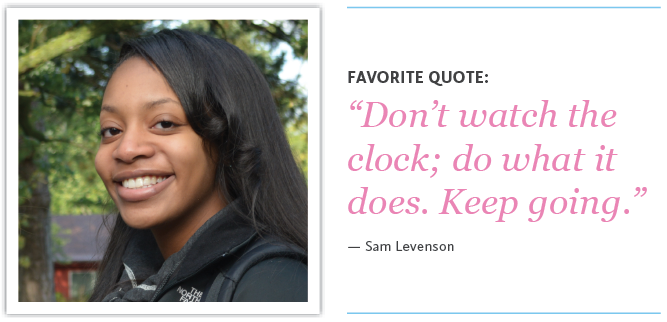
Dogs and cats are definitely in Brandi Moore’s future. A 19-year-old freshman at Prairie State College, she plans on continuing her studies at Western Illinois University with veterinary school to follow. Brandi is a recipient of the 2014 Sheilah A. Doyle Foundation Scholarship.
She cites family and her personal dedication to achieving goals as her inspiration. It has not been an easy road. She and her five siblings lost their mother to homicide. She is also expecting her first child. The scholarship, however, makes a huge difference. In speaking about her application, she says, “I was nervous at first. A lot of people apply for it. I was very excited to find out that I did get it. This is the only scholarship that I actually received.”
Brandi will use the monetary award to pursue a career she has loved since she was a child. “I used to watch animal planet every day all day. I’ve had a lot of experiences where I’ve helped animals around my house. We have a lot of loose dogs around. My brother and I would chase them to find their owner.” Brandi once found a small, fluffy white dog on her neighbor’s doorstep. She flipped it over and found it bleeding heavily from an attack.
“I brought it home and called the police and wrapped it in a towel. I reacted on instinct … they had to put her down because the surgery would have been too much for her. She was in a bad shape,” she said, remembering the incident.
“She let me comfort and love her. Like the kids at camp, they have to be open to receiving comfort. They have to be open on their own terms. You can help them but not force them (to accept),” Brandi explains.
Brandi has attended the S.A.D. camp for four years. “It helped me to open up more, cope with things better. For example, I remember, this year, the first day I came to camp, I didn’t really want to do it because I didn’t know how people would feel about my pregnancy. As the day progressed, and in the healing circle, I opened up more. And then the last one really impacted me. I just opened up and let everything out. I was sitting there listening to other stories and it hit me that my mom is not going to be here to see her first grandchild. I was just sitting there and it hit me out of nowhere and I shared it with everybody and I broke down and cried.”
Returning campers’ experiences change as their grief journey progresses. Brandi says that in 2013, she grieved all weekend. The first one, she didn’t open up very much but was made to feel welcome to do a lot of things. This year, camp felt more natural and comfortable. She says hearing everyone else’s story and advice, especially Alyssa’s, gave her confidence. “She (Alyssa) was saying a lot of positive stuff that I caught onto,” said Brandi. Brandi’s brother, Byron, was the 2013 Sheilah A. Doyle Foundation scholarship recipient and is a student of Eastern Illinois University. Her brothers Brelyn, 16, and Bradley, 13, are also camp veterans.
So, what does Brandi think made her essay shine? “I guess they saw something in me from attending all four years that really touched them. We’ve grown really close to them and I feel like they have a good understanding of me and my family. They’ve paid a lot of attention to our whole journey,” she said.
Brandi has grown up right along side the Sheilah A. Doyle Foundation, an organization she calls “amazing.” This is how she describes it, “It’s very supportive and healing. You receive support all around, all throughout the weekend and you’re always comforted. It’s challenge by choice. My understanding of this is taking a leap of faith. I don’t really feel like most kids grieve positively and, most of the time, it’s because they don’t know how and they don’t have that figure to show them how they can or how long and that it’s okay. Some don’t have that support or someone to guide them in the right way. The foundation helps. It helps them when they are young, going into a positive way and grieving right rather than doing just anything. It’s a great guide for them, especially if you don’t have … someone telling you.”
ALYSSA GAZZANO
2014 Scholarship Recipient
School: Marquette University
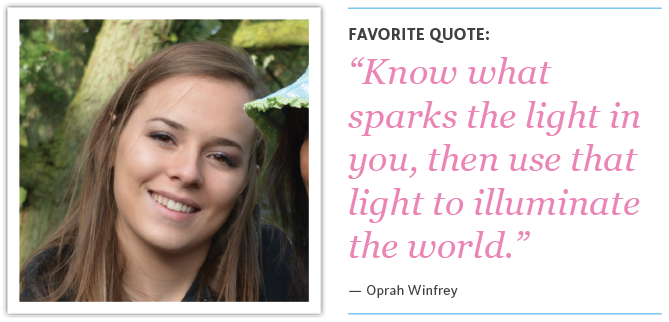
As she sat in her Marquette University dorm room, 18-year-old Alyssa Gazzano held the unopened letter with the pink and blue graduate logo on the envelope in her hand as she called her mom at their Bartlett home. Both were shocked and happy as Alyssa read the letter congratulating her as a 2014 Sheilah A. Doyle Foundation Scholarship Recipient.
“A weight was lifted off my shoulders,” the 18-year-old Marquette freshman says with a happy sigh. “I am officially part of the foundation and I am so excited to give back and to volunteer as a Big Buddy and attend events.”
Majoring in biomedical sciences with a minor in business administration, Alyssa aims to travel to third world countries, including Africa, where access to clean water and the ensuing spread of disease runs rampant. With her degree, she wants to be a director at a hospital where she can nurture staff and patients.
Attending the 2014 Sheilah A. Doyle Foundation camp this past September broadened her appreciation of the role people play within communities. “It makes me feel more empathetic toward people,” she said.
Every Monday from seven to nine, she volunteers at The Guest House, a homeless shelter near her college where residents participate in a two-year program to transition into housing. Given her love of art, she provides an art workshop as a way to help residents express themselves. Alyssa loves volunteering and “… the feeling that I get knowing that I am helping someone else and making someone else’s day a little brighter and that I’m responsible for that.”
She likens her experience at the shelter to the S.A.D. camp. “People from different backgrounds can have something in common. When I talk to the residents, we talk about shows we watched as kids and our favorite foods, even though we’re so different. I think that has to do with attending the Sheilah A. Doyle Foundation camp, too. We became very close in a short amount of time.”
Alyssa recalls the day she lost her father in 2007. Partway through a presentation to her fifth grade class, her principal barged into the room and said, “Hurry, grab your things and let’s get going.” Alyssa opened the door to the social worker’s office, thinking she was in trouble. Her mother sat there, pale, a look of shock on her face. Alyssa’s parents were divorced, her father living in Las Vegas at the time, but the family stayed in close touch. Alyssa describes her father as “really good to me.”
She explains, “I asked her what was wrong. She said, ‘Last night your daddy passed away.’ I was 10. I started crying. All the staff was supportive and comforted us. I was confused about what happened. He wasn’t sick.”
While out for the evening, Mr. Gazzano was the victim of a random, drive-by shooting by a group of teenage boys under the influence. Alyssa says, “They didn’t know who he was. In court, they said they had no intention of shooting him. My cousin recognized the car and license plate and tracked it down to a group of boys that ended up going to jail. My dad died. The driver of the car was deported back to Mexico. The other two are still in jail but they will get out on parole.”
The aspiring medical student credits her mother for giving her strength to grow and pushing her to succeed. “She would tell me: instead of letting this break you, you have to make your dad be proud of you,” says Alyssa.
Since the death of her father, Alyssa has dreamed of him about 10 times. “I will be walking down the street and see my dad across the street. And I scream, ‘I thought you were dead.’ And he says, ‘I’m still here.’”
After attending the S.A.D. camp, she dreamed of her father again. “I was telling him that I’m in college now and my mom is married and I have a boyfriend. It reminded me of camp at the bonfire where we are sending a message (where campers write a message to their loved one and put it into the fire). And I woke up and cried. I saw him.”
Alyssa credits the Sheilah A. Doyle Foundation with taking the most destructive thing in a person’s life and doing something amazing with it. “It’s all how you look at things. Beauty is in the eye of beholder. You’re not the only one going through it. It’s incredible what they do for people. It’s so inspiring. I want people to know that although bad things happen to us, use those things as fuel to do better.”
